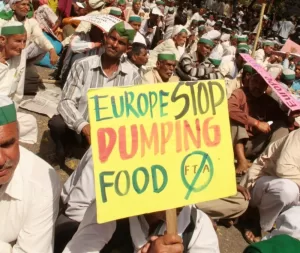The negotiations on fisheries subsidies at the World Trade Organisation (WTO) have now entered the phase of text-based negotiations. This has taken about 20-odd years. However, even now the draft text does not address the concerns of the developing and least developed countries.
While the Director General-WTO, Okonjo-Iweala and the Chair, Ambassador Santiago Wills of Colombia hailed a meeting on July 15 to discuss the revised text as a success towards achieving an outcome at the 12th Ministerial Conference in December 2021, many sources have informally refuted their claims.
Trade ministers and senior officials from a majority of countries opined that the current draft text is imbalanced and maintains status-quo by allowing the big subsidisers to continue with their industrial-scale fishing, which is the main contributor to overcapacity and overfishing and is responsible for the global depletion of fish stocks.
Moreover, developing countries emphasised that special and differential treatment (S&DT) should, based on the principle of common but differentiated responsibilities, provide “policy space” to develop their respective fishing sectors. There is an attempt to make provisions under S&DT time bound and geographically limited. Adam Wolfenden, Campaigner, Pacific Network on Globalisation argues, “S&DT is a central part of these negotiations…attempts to reduce that to minimal time and geographical bound carve-outs for a subset of small-scale fishers undermines the concept that was mandated by leaders to be appropriate and effective. The current proposals are neither”.
According to the 2017 FAO assessment, the percentage of stocks fished at biologically unsustainable levels increased from 10% in 1974 to 34.2% in 2017 (FAO, 2020). This indicates a rise in the depletion of natural fish resources due to overfishing. In 1995, the WTO members agreed to include discussions on removing environmentally harmful and trade distorting fisheries subsidies. These subsidies include such support by country governments to their fishing sector as financial incentives to domestic industry, support for construction of new vessels, fuel tax exemptions, transfer of fishing equipment to private sector at low or no cost, and many others.
Subsidies to Large Scale Industrial Fisheries
While sustainability of fisheries stock is a major concern, the concerns pertaining to livelihood of scores of people depending on it also acquire importance. In 2018, an estimated 59.5 million (FAO, 2020) people were engaged in the primary sector of fisheries and aquaculture, with 39 million in fisheries sector.
Estimates provided by Schunhbauer, et al. (2020) show that in 2018, USD 35.4 billion fisheries subsidies were provided globally. Of this, 19% went to the small-scale fishing sub-sector (SSF), including artisan, and subsistence fisheries, and about 80% went to the large-scale (industrial) fishing sub-sector (LSF).
Moreover, the majority of the subsidies that the LSF receives are in the form of capacity-enhancing subsidies. Assessing the level of subsidisation per active fisher at the global scale, Schunhbauer, et al. (2020) estimate that a fisher involved in LSF receives disproportionally (i.e. 3.5 times) more subsidies than a fisher involved in SSF (see figure).
Figure: Global Fisheries Subsidies (2018 constant USD) per number of fishers
per Developed and Developing Nations

A comparison of LSF and SSF subsidy between a developed and developing nation shows that in a developed country nearly USD 24 thousand subsidy per fisher is given to industrial or LSF sector which is USD 666 in a developing country. The small scale sector in both developed and developing country does not receive much subsidy in comparison.
Issues With Draft Text
Under the Draft Text, Article 5, there is prohibition on ‘Subsidies Concerning Overcapacity and Overfishing’, which targets removal of capacity building subsidies. Article 5.1.1, however, is clearly worded to benefit the developed countries, which says that a member can continue to subsidise if it can demonstrate that the measures are implemented to maintain the stock in the relevant fisheries at a biologically sustainable level.
In addition to this, almost all least developed countries and most developing countries are yet to build their capacity. Developed countries have already built huge capacities and fishing vessels. Once the subsidies are removed, these developed countries would have monopoly profits while fisheries sector of least developed countries would get wiped out.
“At the WTO fisheries negotiations, the real intention is not the sustainability of fisheries sector. This is just a façade. The real intention is that the developing countries do not build their capacity and the countries which already have huge capacity get a free run on the profits,” cautions Abhijit Das, Professor and Head, Centre for WTO Studies, India.
The WTO negotiations on fisheries subsidies had begun in 2001 at the Doha Ministerial Conference. The objective was to “clarify and improve” existing WTO disciplines on fisheries subsidies. At the Hong Kong Ministerial Conference in 2005, there was a call for prohibiting certain forms of fisheries subsidies that contribute to overcapacity and overfishing. In 2017, at the 11th Ministerial Conference, it was decided to achieve an agreement on fisheries subsidies by 2020, in line with the SDGs.
The Sustainable Development Goals (SDG) 14.6 targets to “by 2020, prohibit certain forms of fisheries subsidies which contribute to overcapacity and overfishing, and eliminate subsidies that contribute to illegal, unreported and unregulated (IUU) fishing, and refrain from introducing new such subsidies, recognising that appropriate and effective special and differential treatment (S&DT) for developing and least developed countries should be an integral part of the WTO fisheries subsidies negotiation.”
According to Ranja Sengupta, Senior Researcher with the Third World Network, “The objective of SDG 14.6 will be turned upside down if the large subsidisers escape from disciplines under the provisions of Article 5.1.1, and also imply a betrayal of Common But Differentiated Responsibility (CBDR). Small fishers in India are extremely worried and baffled about this heavy push back against S&DT as they are not even the source of unsustainable fishing, while distant water fishing nations like the EU will continue to have the opportunity to provide domestic subsidies to their fleets,” said
India’s Response at the WTO and Marine Fisheries Bill
The Indian Commerce Minister Piyush Goyal has stressed that “it is essential that big subsidisers take greater responsibility to reduce their subsidies and fishing capacities, in accordance with the principles of ‘Polluter Pays’ and ‘Common But Differentiated Responsibilities’.” He demanded that “countries like India who are yet to develop fishing capacities, cannot sacrifice their future ambitions.”
India has been negotiating for a blanket S&DT arguing that “limiting S&DT to poor and artisanal fishermen only is neither appropriate nor affordable, and is not acceptable. S&DT is required to not only protect livelihoods of poor fishermen but also to address food security concerns, have necessary policy space for developing the fisheries sector and the need for larger time period for any transition”.
However, while India has reacted strongly to the draft WTO text by calling the elements of the text as “unequal, unfair and unjust”, domestically the central government is planning to introduce the Indian Marine Fisheries Bill, 2021 in the ongoing Parliament session. A number of trade unions and the state government of Tamil Nadu have opposed the Fisheries Bill as the provisions are loaded against traditional fishermen, while more decision-making powers have been vested with the Centre.
“This Bill is far from the realities of Indian marine fisheries as all kinds of boats, including the mechanised fishing boats like trawlers and purse seiners, are designated as small-scale boats. It is a blatant betrayal of the small-scale fishing communities and an open attempt to subjugate the livelihood of small-scale fishers to the interests of mechanised boat owners.” says Pradip Chatterjee, convener of the National Platform for Small Scale Fish Workers.
The Draft Marine Fisheries Bill formulated by the Government of India, when looked at in conjunction with the WTO negotiations on subsidies, will wreak havoc not only on the lives of the small fisher-folk but also wipe off the already depleting fisheries stock, Chatterjee said. The Platform has asked for the deferring of the Bill until the concerns are properly addressed, and stakeholder consultations are undertaken.
The small fisher-folk, who do not get much of the subsidies anyway, are always at the receiving end, be it the better-off and more advanced counterparts in the business or the larger policies of the government. If the government formulates policies in consultation with those marginalised communities that are affected the most, the questions of sustainability of natural resources and protecting the livelihoods of the vulnerable both would get answered.
(Courtesy: Newsclick.)




